Can you devise a strategy for limiting global heating to 1.5 DegC?
Using the C-Roads and En-Roads climate simulation models we run workshops which allow participants to explore different possible scenarios for reducing emissions of green house gas to ensure that global heating stays well below 2 DegC or even as low as 1.5 DegC.
Find out more here: Climate Interactive Workshops.
In these workshops, we will introduce you to the simulator, provide you with the opportunity to reflect and discuss possible strategies for limiting global heating and then ‘run’ the simulations real-time to discover how well your strategies might work.
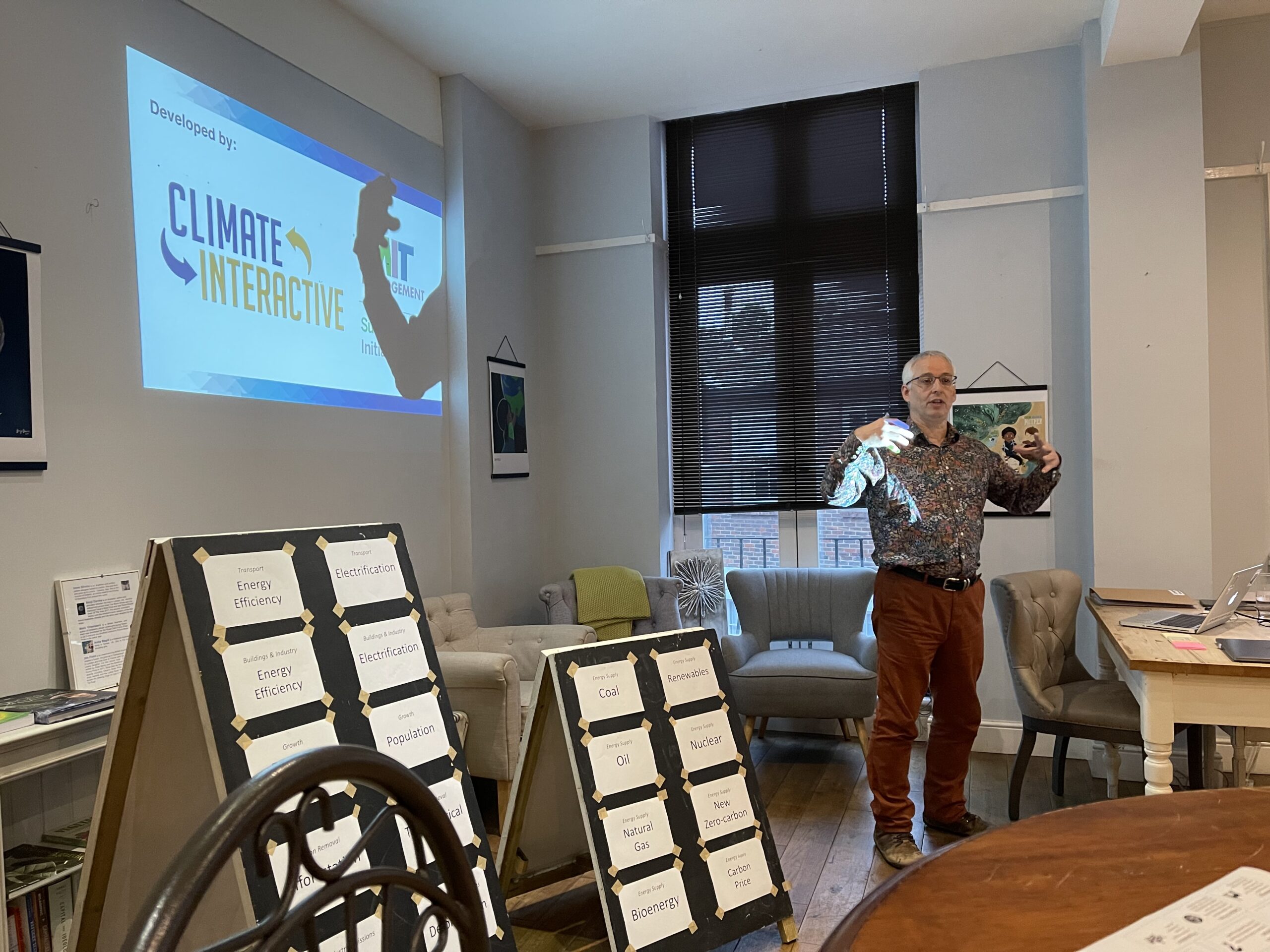
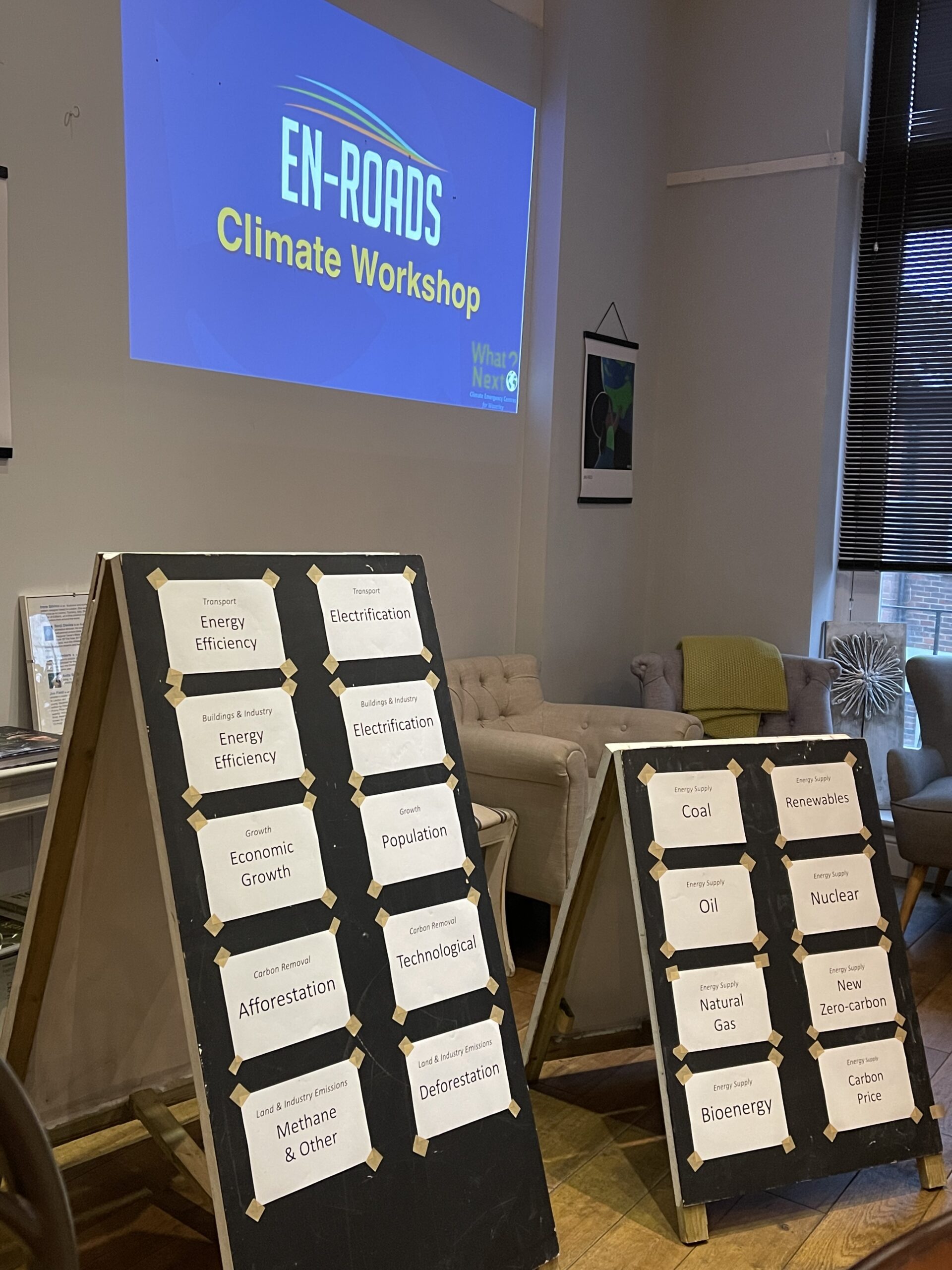
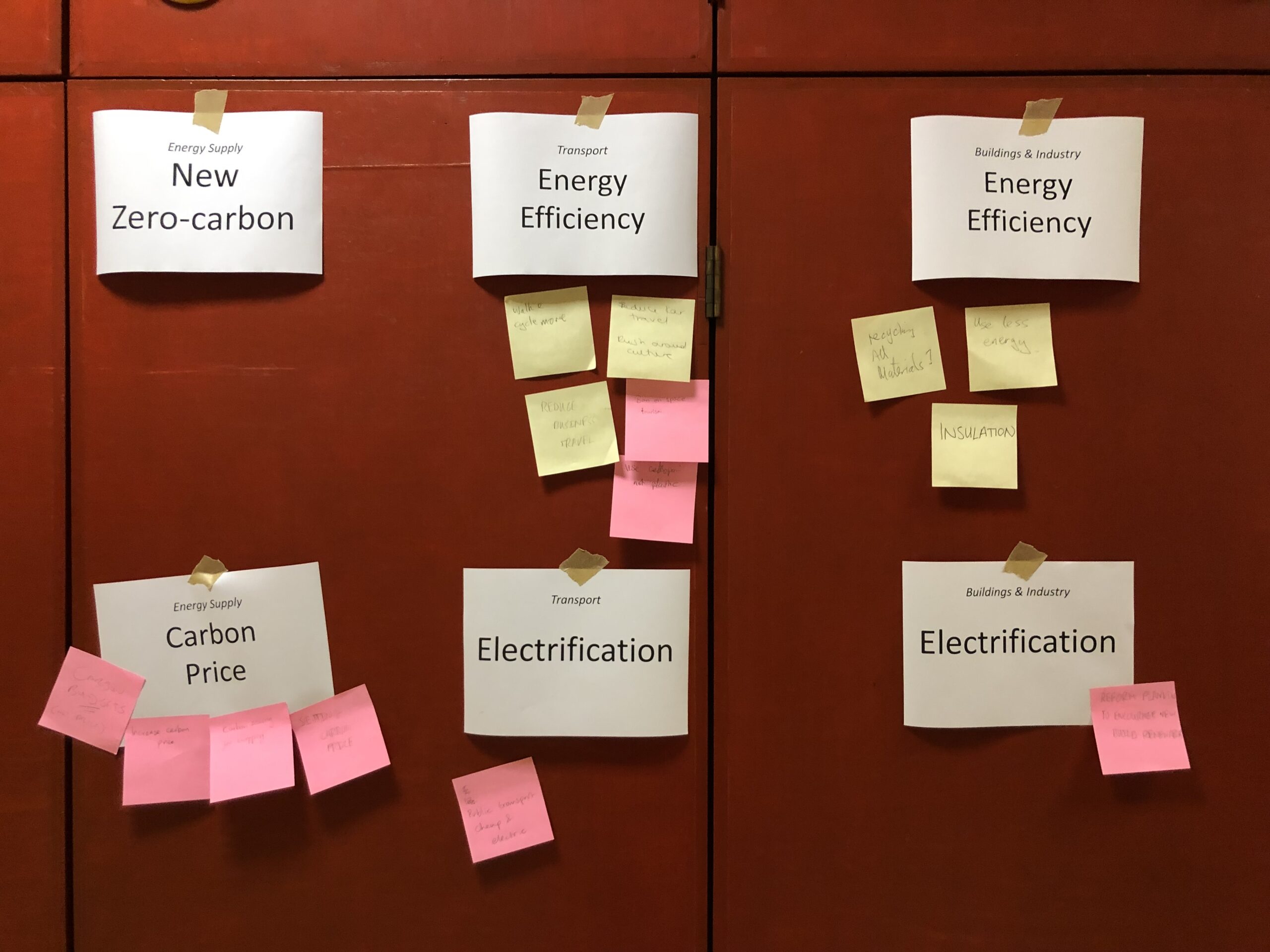
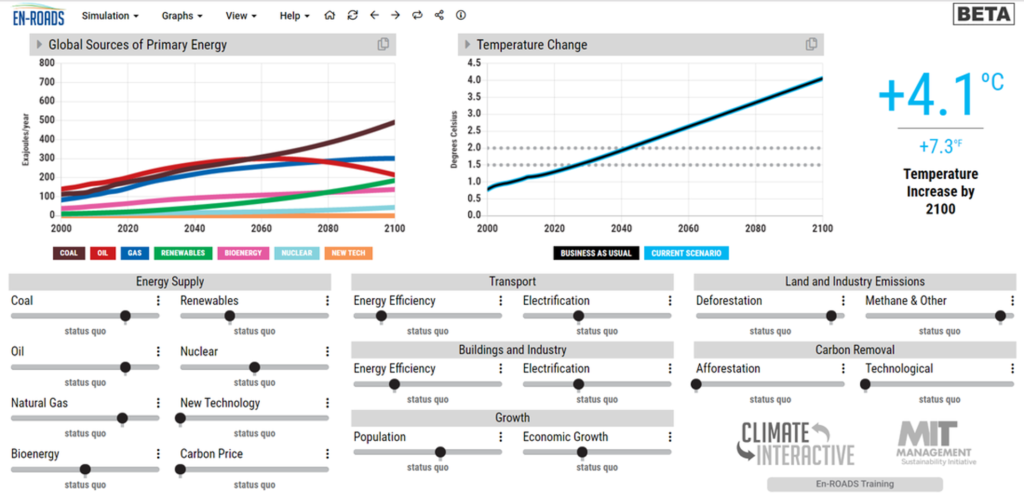
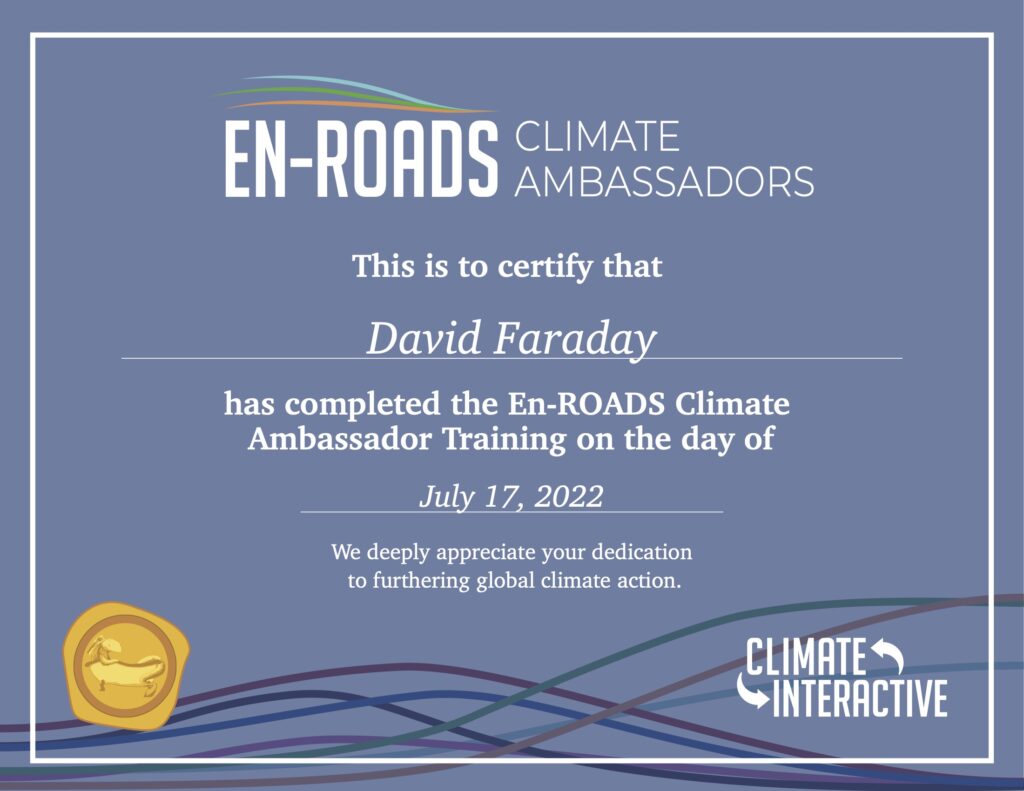
We have trained facilitators who will guide you through these climate simulations in an stimulating and informative way. Our lead faciliator, Dr. David Faraday, is a registered Climate Ambassador.
Next Public Workshop
Next Public Workshops: Thursday 22nd June, 18:30 to 20:30 (On-line)
Tickets
Click here to book a place on Eventbrite.
Further public workshops dates:
Thursday 23rd March, 18:30 to 20:30 (On-line)
Thursday 27th April, 18:30 to 20:30 (On-line)
Thursday 25th May, 18:30 to 20:30 (On-line)
Thursday 22nd June, 18:30 to 20:30 (On-line)
Thursday 27th July, 18:30 to 20:30 (On-line)
Often workshops are free of charge, but sometimes we charge a nominal fee of £3. Additional donations are welcome to help meet our running costs.
Book a Workshop for your Group / Business
We run Climate Action Simulation Workshop for community groups and businesses. Our workshops can accommodate between 6 and 40 participants, they are highly interactive and provide an ideal opportunity for people to engage in the debate about how to tackle climate change. E-mail us for more details (See contact e-mail at the bottom of this page).
Previous Workshops & Outcomes
Public Event, On-line, Thursday 27th October, 2022.
Outcomes: initial proposals, final outcome.
Predicted Outcome: Global Peak CO2 478 ppm in 2069; Net Zero reached in 2066; predicted Global Average Temperature (in 2100) 2.2 DegC ; Overall Energy Demand (in 2100) 263 ExaJ/yr, compared to 599 ExJ/yr (in 2022), a 56.1% reduction; Cost of Energy (in 2100) $22.1/GJ, compared to $23.8/GJ (in 2022), a 7.1% reduction; Rate of Carbon Removal (in 2100) 2.75 GT/year, compared to an Annual Increase in Carbon of 18.9 (in 2022).
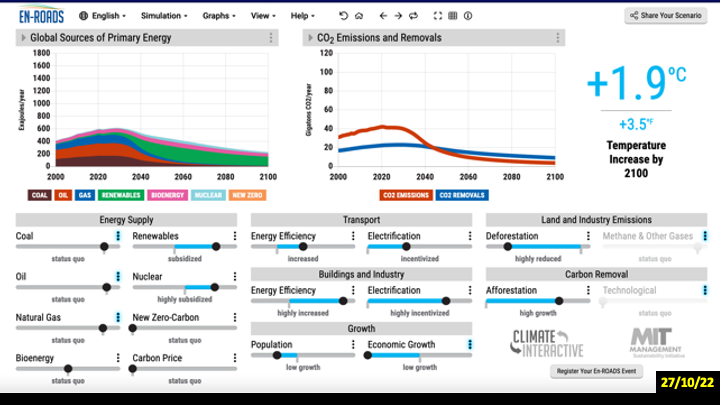
Public Event, On-line, Thursday 29th September, 2022.
Outcomes: initial proposals, second round, third round, final outcome.
Predicted Outcome: Global Peak CO2 462 ppm in 2059; Net Zero reached in 2056; predicted Global Average Temperature (in 2100) 2.0 DegC ; Overall Energy Demand (in 2100) 264 ExaJ/yr, compared to 599 ExJ/yr (in 2022), a 56.1% reduction; Cost of Energy (in 2100) $22.3/GJ, compared to $23.8/GJ (in 2022), a 6.3% reduction; Rate of Carbon Removal (in 2100) 5.27 GT/year, compared to an Annual Increase in Carbon of 18.9 (in 2022).
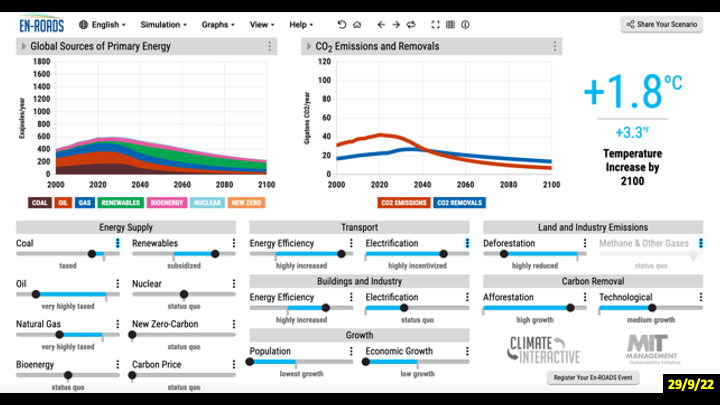
Public Event, On-line, Monday 25th July, 2022.
Outcomes: initial proposals, final outcome.
Predicted Outcome: Global Peak CO2 458 ppm in 2060; Net Zero reached in 2057; predicted Global Average Temperature (in 2100) 2.1 DegC ; Overall Energy Demand (in 2100) 172 ExaJ/yr, compared to 599 ExJ/yr (in 2022), a 71.3% reduction; Cost of Energy (in 2100) $22.1/GJ, compared to $26.4/GJ (in 2022), a 10.9% increase; Rate of Carbon Removal (in 2100) 3.31 GT/year, compared to an Annual Increase in Carbon of 18.9 (in 2022).
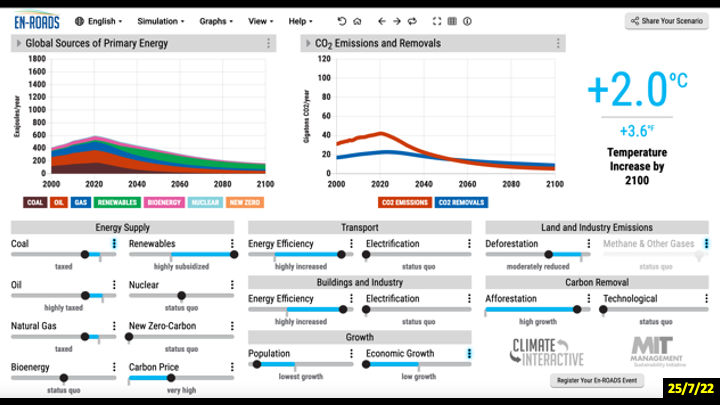
Workshop for Waverley & Borders XR, On-line, Wednesday 12th January, 2022.
Outcomes: initial proposals, final outcome.
Predicted Outcome: Global Peak CO2 451 ppm in 2050; Net Zero reached in 2045; predicted Global Average Temperature (in 2100) 2.1 DegC ; Overall Energy Demand (in 2100) 404 ExaJ/yr, compared to 599 ExJ/yr (in 2022), a 32.6% reduction; Cost of Energy (in 2100) $25.9/GJ, compared to $23.8/GJ (in 2022), a 8.8% increase; Rate of Carbon Removal (in 2100) 2.7 GT/year, compared to an Annual Increase in Carbon of 18.9 (in 2022).
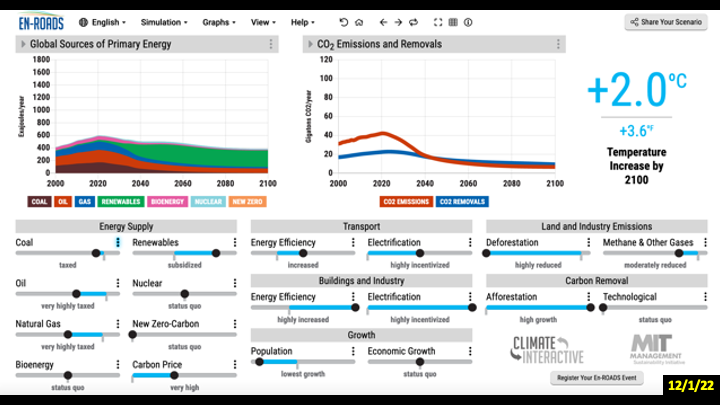
Workshop for Waverley Borough and Godalming Town Councillors, and Council Staff, What Next Centre, Monday 8th November, 2021.
Outcomes: initial proposals, final outcome.
See the feature on the Waverley Borough Council website.
Predicted Outcome: Global Peak CO2 445 ppm in 2047; Net Zero reached in 2043; predicted Global Average Temperature (in 2100) 2.0 DegC ; Overall Energy Demand (in 2100) 290 ExaJ/yr, compared to 599 ExJ/yr (in 2022), a 51.6% reduction; Cost of Energy (in 2100) $22.8/GJ, compared to $23.8/GJ (in 2022), a 4.2% reduction; Rate of Carbon Removal (in 2100) 2.24 GT/year, compared to an Annual Increase in Carbon of 18.9 (in 2022).
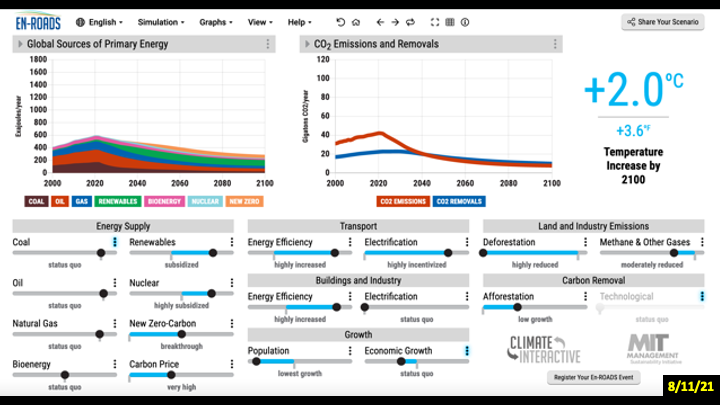
Workshop for Guildford Schools, On-line Event, Thursday 21st October, 2021.
Outcomes: initial prosposals, intermediate proposals, final outcome.
Predicted Outcome: Global Peak CO2 447 ppm in 2041; Net Zero reached in 2040; predicted Global Average Temperature (in 2100) 1.9 DegC ; Overall Energy Demand (in 2100) 434 ExaJ/yr, compared to 599 ExJ/yr (in 2022), a 27.5% reduction; Cost of Energy (in 2100) $23.0/GJ, compared to $23.8/GJ (in 2022), a 3.4% reduction; Rate of Carbon Removal (in 2100) 4.13 GT/year, compared to an Annual Increase in Carbon of 18.9 (in 2022).
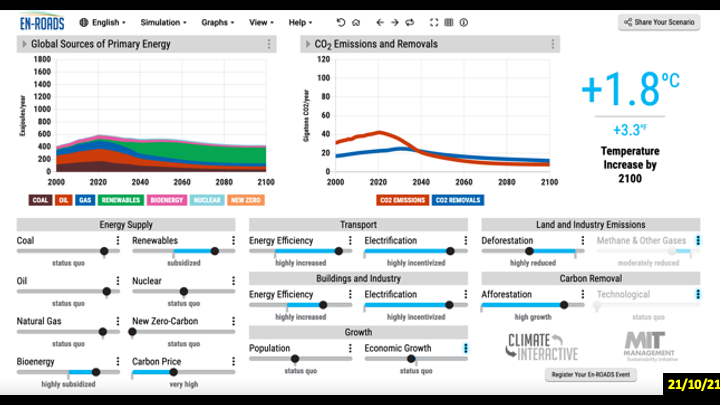
Public Event, What Next, Friday 24th September, 2021.
Zero Carbon Guildford, Monday 20th September, 2021.
Predicted Outcome: Global Peak CO2 448 ppm in 2043; Net Zero reached in 2041; predicted Global Average Temperature (in 2100) 2.0 DegC ; Overall Energy Demand (in 2100) 353 ExaJ/yr, compared to 599 ExJ/yr (in 2022), a 41.1% reduction; Cost of Energy (in 2100) $23.6/GJ, compared to $23.8/GJ (in 2022), a 0.8% reduction; Rate of Carbon Removal (in 2100) 4.49 GT/year, compared to an Annual Increase in Carbon of 18.9 (in 2022).
